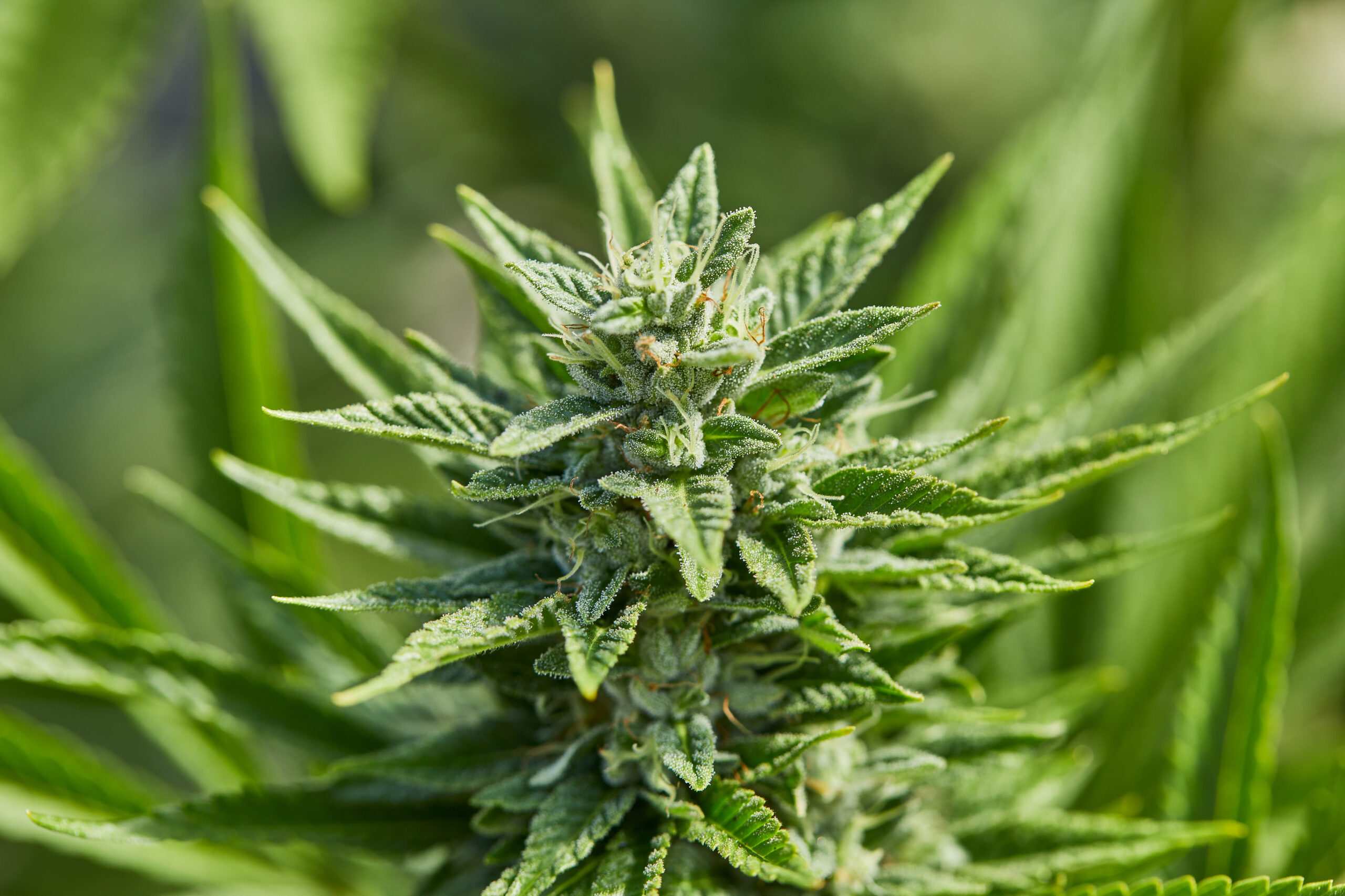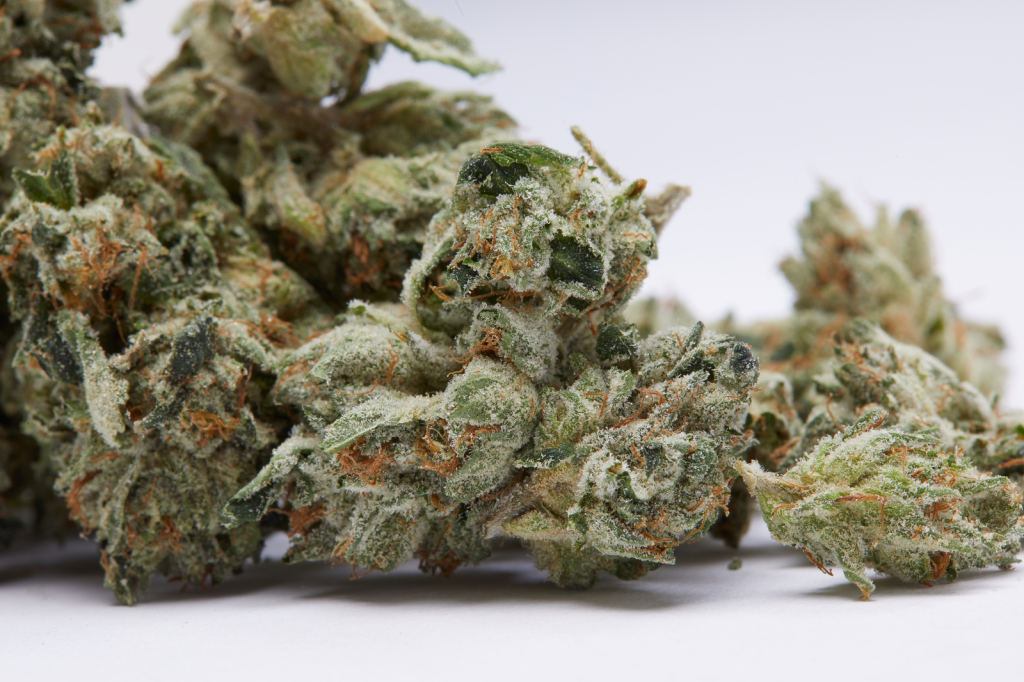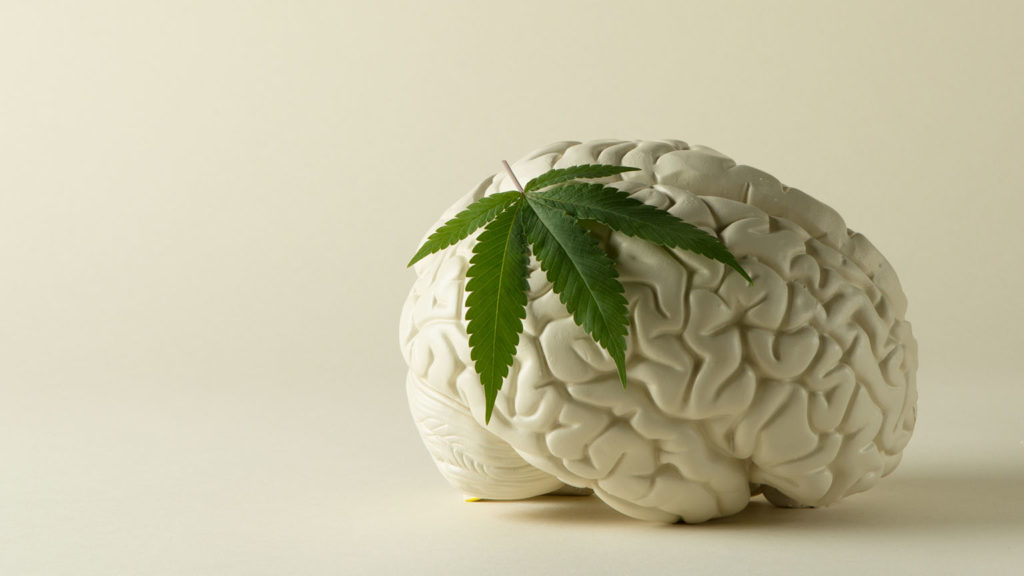To smoke or not to smoke — that is a question. And far from the only one to consider if you're thinking about consuming weed for the first time. When it comes to health, knowledge is power.
Learn about the pros and cons of consuming weed, including medical cannabis, and determine which consumption method is the right choice for your body.
Is weed healthy for you?
Cannabis contains many compounds that cause various effects. For example, CBD (cannabidiol), the second-most abundant compound found in cannabis after THC (tetrahydrocannabinol), has been shown to have anti-inflammatory properties without causing intoxication.
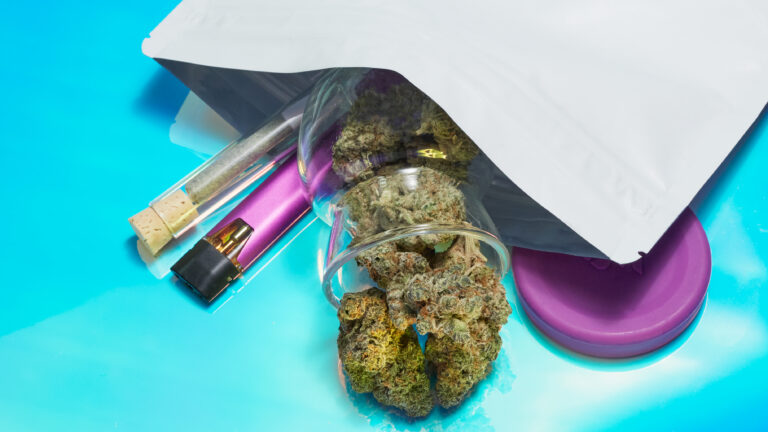 Photo by: Gina Coleman/Weedmaps
Photo by: Gina Coleman/WeedmapsImage lightbox

Some proven benefits of cannabis include pain relief, treatment of certain types of epilepsy, appetite stimulation, and a reduction in nausea for some patients undergoing chemotherapy. At the same time, there are also potential risks since smoking cannabis may harm the lungs, and overconsumption can lead to uncomfortable side effects like anxiety, increased heart rate, and paranoia. THC, the most abundant, intoxicating compound found in cannabis, can impair motor coordination and increase the risk of accidents when driving.
What are the benefits of weed on your physical health?
Both preclinical and clinical studies have shown that compounds like THC and CBD have health benefits. However, more research is often needed to determine the full extent and potential limitations of these effects.
Some of the potential physical health benefits of cannabis include:
- Pain: Weed can act as an analgesic, helping to alleviate chronic pain.
- Inflammation: Almost all cannabinoids, including THC, CBD, CBG, CBDA, THCA, and CBGA, are proven to have anti-inflammatory effects.
- Appetite: For patients with conditions like HIV/AIDS or cancer where appetite loss or cachexia is a concern, weed may help stimulate appetite. The Food and Drug Administration (FDA) has even approved Marinol (generic name: Dronabinol), a man-made form of THC that acts as an antiemetic.
- Muscle spasms: Cannabis has shown potential in helping to reduce muscle spasms, especially in conditions like multiple sclerosis (MS).
- Nausea: THC may help in reducing nausea and vomiting, often associated with chemotherapy treatments for cancer.
- Neuroprotection: Limited research suggests that certain cannabinoids like THC and CBD have neuroprotective properties, potentially benefiting people suffering from conditions like Parkinson's disease.
- Endocannabinoid deficiency: The human endocannabinoid system regulates sleep, mood, pain, immune response, memory, and hunger. A clinical endocannabinoid deficiency may occur when there is an imbalance in the body's regulation system, something cannabinoids may help with.
- Glaucoma: THC can reduce intraocular pressure in the eyes, offering temporary relief for glaucoma patients, though most doctors don't consider it a primary or long-term treatment option.
- Sleep: For some individuals, cannabis can help with falling asleep and reducing the risk of insomnia.
- Cancer: Some in-vitro (petri dish) and in-vivo (animal) studies have demonstrated that cannabis compounds may help in the fight against cancer. A wealth of anecdotal evidence and published research exists showing cannabis can help relieve some of the pain involved in traditional cancer treatment. However, much more research is needed.
- Gastrointestinal disorders: The GI tract contains cannabinoid receptors, so cannabinoids like THC and CBD can influence GI function and symptoms when consumed. Cannabis may help manage the symptoms of IBS, notably pain, but further research is crucial to pinpoint the best cannabinoid regimen.
What are the risks of weed on your physical health?
Cannabis has various potential risks related to physical health.
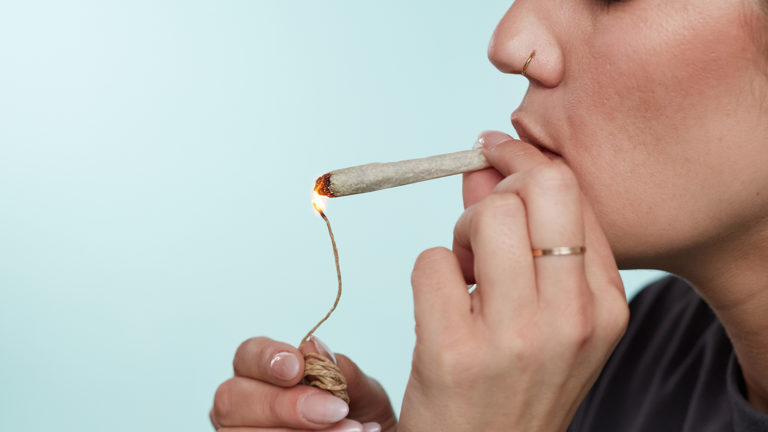 Photo by: Gina Coleman/Weedmaps
Photo by: Gina Coleman/WeedmapsImage lightbox

Some of the main concerns to consider and discuss with your doctor include:
- Lung health: Smoking weed can lead to bronchitis-like symptoms and may harm the lungs over time. Chronic bronchitis symptoms, lung infections, and other respiratory problems can arise from regular smoking.
- Impaired coordination: Intoxication caused by THC can increase the risk of accidents, particularly if you're driving or operating heavy machinery. Avoid operating heavy machinery or vehicles after consuming.
- Cardiovascular risk: Marijuana use can elevate your heart rate for several hours, potentially increasing the risk of heart attack in those with pre-existing heart conditions.
- Contaminants: Weed, especially when it's not sourced from reputable outlets, might contain contaminants like molds, pesticides, or other harmful substances, which can pose health risks when consumed.
- Allergies: It's possible to experience an allergic reaction to cannabis.
- Weed hangover: It's possible to experience a weed hangover as a result of overconsumption, typically with edible products that take longer for the body to process.
- Testicular cancer risk: Some studies have suggested a potential link between cannabis use and an increased risk of testicular cancer, though findings are not consistent.
- Pregnancy risk: There is conflicting evidence that pregnant people who use cannabis might have increased risks during pregnancy, and there is substantial evidence of a statistical association between maternal cannabis smoking and lower birth weight of the baby.
What are the benefits of weed on your psychological health?
Individual responses vary widely, and research on weed and brain health has gone in many different ways and with no absolute conclusions.
However, some potential psychological benefits of cannabis include:
- Anxiety and stress: For some, cannabis can have anxiety-relieving properties. The dose (typically low) and cannabinoid ratio (often a balanced ratio of THC:CBD) have a large impact on the potential benefits. But for many people, high-THC products — particularly edibles — may exacerbate anxiety.
- Depression: There is some evidence to suggest that cannabis compounds like CBD and CBG can help with depression. THC can also produce feelings of euphoria, potentially helping to alleviate symptoms of depression in some individuals. However, long-term, frequent use can also have the opposite effect for some people. It's important to consult with a licensed psychiatrist to find a medication regimen that works best for you.
- PTSD: Some studies suggest that weed can help reduce the severity of post-traumatic stress disorder (PTSD) symptoms, including nightmares.
- Mindfulness: Some individuals report feeling more "in the moment" when using cannabis, which can enhance mindfulness practices and improve overall well-being.
- Reduced dependence: Some people use cannabis as a substitute for more harmful substances — such as opioids or excessive alcohol — to reduce their intake or dependence on these substances.
- Creativity: While subjective and anecdotal, many consumers report heightened creativity and novel thinking when partaking.
What are the risks of weed on your mental health?
Cannabis can have various psychological effects, and while some individuals report benefits, there are potential risks associated with its use.
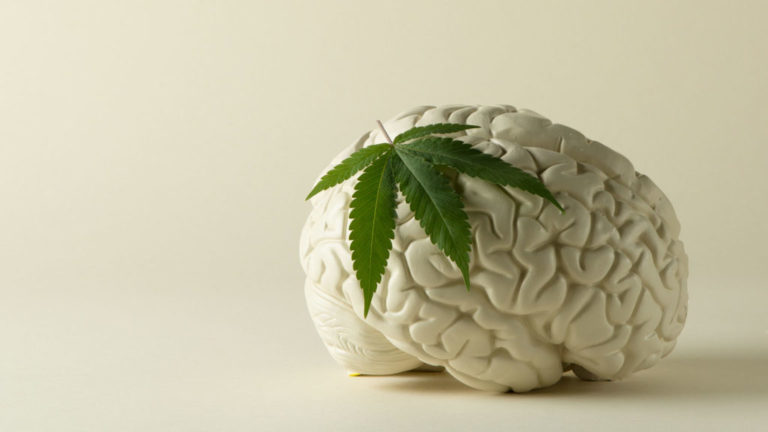 Photo by: Gina Coleman/Weedmaps
Photo by: Gina Coleman/WeedmapsImage lightbox

Here are some of the main psychological risks associated with weed:
- Anxiety and paranoia: While some people use weed to reduce anxiety, others might experience heightened anxiety or paranoia — especially when they consume high doses of THC or the wrong strain.
- Impaired memory: Acute cannabis use may cause reversible short-term memory loss.
- Psychosis: While incredibly rare, individuals predisposed to psychotic disorders may experience symptoms like hallucinations, delusions, and disorganized thinking after consuming high amounts of THC.
- Cannabis use disorder: Cannabis use disorder (CUD) is a psychological dependence on cannabis. Frequent users can develop it over a long period of use, leading to cravings, increased tolerance, and withdrawal symptoms like irritability, mood swings, and sleep disturbances when not consuming.
How does consumption method affect risks and benefits?
How you consume cannabis can affect your experience and health risks. Weigh your options and discuss them with your doctor before starting a cannabis regimen.
| Consumption method | Potential risks | Potential benefits | Average onset time |
| Vaping | Possible exposure to harmful chemicals if you purchase vapes from unlicensed retailers. | - Typically less tar and carcinogenic compounds compared to smoking. - Faster onset compared to edibles and some tinctures. | Within minutes |
| Smoking | - Inhalation of tar, carcinogens, and other harmful compounds. - Potential for respiratory issues and lung irritation. | - Immediate onset. - Familiar method for many users. | Within minutes |
| Sublingual tinctures | - Potential for overconsumption if the dose is not measured properly. - Some might not like the taste or sensation of holding the tincture in the mouth. | - None of the risks associated with inhalation. - Precise dosing when labeled and administered properly. - Bypasses the digestive system for faster onset compared to edibles. - Discreet method of consumption. | 15 - 45 minutes |
| Edibles | - Risk of overconsumption due to delayed onset. - Dosage can be unpredictable, especially with homemade edibles. - Longer-lasting effects, which some users might not desire. - High sugar content in some products. | - None of the risks associated with inhalation. - Effects last longer than other methods. - Wide variety of product types available (cookies, gummies, chocolates, etc.). | 30 minutes to 2 hours (sometimes longer depending on individual metabolism) |
Bottom line
If you're thinking of smoking cannabis for pain relief, as a way to manage symptoms related to autoimmune disorders, or as a treatment for other conditions, then you'll first want to talk to a doctor experienced in cannabis medicine.
 Photo by: Gina Coleman/Weedmaps
Photo by: Gina Coleman/WeedmapsImage lightbox

There are several factors to consider when deciding whether to smoke cannabis. You can opt for different delivery methods or rule out cannabis entirely — for example, if it dangerously interferes with your other medications.
Before partaking, ask yourself these questions:
- How often will I use cannabis? Patients who frequently use cannabis might benefit from safer administration routes than smoking. While we still need long-term research into the effects of vaping, other research suggests that it offers comparable benefits to smoking and may be safer; however, it's essential to purchase vapes and vaping paraphernalia from licensed retailers or medical dispensaries.
- What do I hope to achieve with cannabis use? Consider whether you're seeking pain relief, improved sleep, or mild relaxation to determine the right cannabinoid ratio for your needs. If you're looking for pain relief without intoxication, for example, consider CBD-only products.
- Is cannabis legal for the purpose I'm considering? Check your local laws to see what types of cannabis are available to you and for what purpose, either recreational or medical.
- How might cannabis interact with my current medications? Before starting any cannabis regimen, talk to your doctor about potential medication interactions. Some research suggests that cannabis can enhance the sedative effect of certain depressants and the anticoagulant effects of certain blood thinners.
FAQ
Is THC healthy for you?
THC has both potential therapeutic benefits and risks. On one hand, THC has been shown to offer pain relief, stimulate appetite, reduce nausea, and alleviate symptoms in certain medical conditions. On the other, it can lead to unwanted psychoactive effects, like short-term memory loss and anxiety, when consumed in large doses.
“Start low and go slow" is a well-known adage and, if followed, can help prevent unwanted side effects from THC. Whether THC is healthy for you depends on the dosage, frequency of use, your medical history, and sensitivity to the potential side effects.
What's the healthiest way to smoke weed?
The healthiest way to smoke weed is to avoid smoking altogether and try consumption methods like licensed and lab-tested edibles, tinctures, and topicals that won't affect your lungs. However, if you are looking to minimize the risks of smoking weed, there are many things you can do, such as buying from licensed dispensaries and taking regular breaks from smoking.
Also, using a clean glass pipe can be a cleaner way to smoke than using a water pipe or bong, which filters out the cannabinoids, so people end up smoking more. At the same time, joints can add combustion by-products from burning paper. Using an herbal vaporizer is very safe and results in significantly less toxin inhalation.
Is vaping weed safer than smoking?
While vaping may reduce exposure to some of the harmful substances found in cannabis smoke, vaping also has its risks, including potential exposure to harmful chemicals if you purchase your vape from an unlicensed retailer.
Vaping is considerably better for your lungs compared to smoking. Using an herbal vaporizer has been shown to reduce inhaled toxins and has not been associated with any significant health risks. Using vape "e-cigarette-like" cartridges may reduce harmful combustion by-products, but the cartridges must be purchased from a licensed retailer to ensure that they do not contain unwanted and potentially dangerous additives.
This article was reviewed by Bonni Goldstein, MD, a physician specializing in cannabis medicine in Los Angeles, California, owner and medical director of CannaCenters, and medical advisor to Weedmaps.com.


